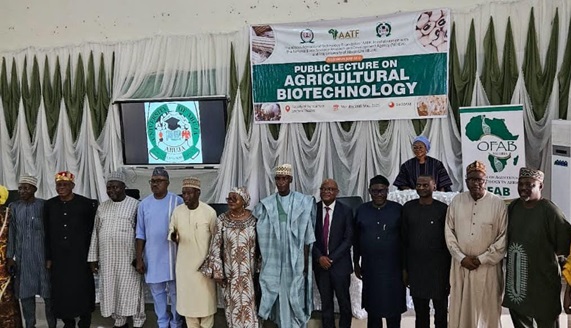
The University of Abuja became a hub of scientific and policy engagement as the institution joined forces with the African Agricultural Technology Foundation (AATF), National Biotechnology Research and Development Agency (NBRDA) and key partners to host a high-level public lecture on agricultural biotechnology. The event attracted students, researchers, traditional rulers, policymakers and stakeholders from across the country, all eager to hear from leaders who have shaped Nigeria’s drive to harness biotechnology for food security and sustainable development.
In her welcome remarks, the acting Vice-Chancellor of the University of Abuja, Prof. Patricia Lar traced the institution’s growth from its early beginnings in the late 1980s to its current status as a centre of research excellence. She stressed the importance of ensuring that breakthroughs in laboratories translate into practical benefits for farmers, especially in rural communities.
“We must guarantee that resilient crop varieties and reduced pesticide use are not just aspirations, but outcomes grounded in the everyday challenges facing Nigeria’s agricultural systems,” she said.
Represented by the dean, Faculty of Science, Prof. Ahmed Dan-Kishiya, Lar highlighted the university’s global collaborations and called for stronger ties between research, policy, and grassroots practice.
Building on this vision, the director-general of the NBRDA, Prof. Abdullahi Mustapha highlighted the urgency of deploying agricultural biotechnology in the face of a rapidly expanding population and worsening climate volatility. He explained how modern tools such as gene editing and molecular breeding could fortify staple crops against pests, diseases, and extreme weather, thus safeguarding national food security.
Mustapha, represented by the agency’s director of agricultural biotechnology department, Dr. Rose Gidado, called on young scientists to look beyond the laboratory and participate in policy development and public engagement, stressing that keeping regulatory frameworks in step with scientific progress is essential. Mustapha noted that embracing biotechnology is not a luxury, but a necessity for Nigeria’s economic resilience and food sovereignty.
In his remarks, the AATF director of product development and commercialisation, Dr. Emmanuel Okogbenin, shared a pan-African outlook on biotechnology adoption. He praised Nigeria, Kenya, and Ghana for pioneering the commercialisation of Bt cotton, Bt maize and pod-borer-resistant cowpea. Okogbenin represented by the AATF TELA Program manager, Yarama Ndirpaya, also pointed to virus-resistant cassava as a promising innovation awaiting approval in several African countries.
However, Okogbenin warned that regulatory uncertainty and persistent misinformation remain major barriers to uptake. He emphasised the importance of evidence-based, inclusive dialogue among farmers, policymakers, scientists and the private sector.
“Through cross-sector collaboration,” he said, “Africa can fully unlock the potential of biotechnology to enhance nutrition, strengthen livelihoods and grow local economies.”
On the theme of public engagement, project manager for the Open Forum on Agricultural Biotechnology in Africa (OFAB), Vitumbiko Chinoko spoke about the critical role of communication in driving adoption. He described how OFAB has hosted workshops, field demonstrations and media briefings to bridge the knowledge gap around genetic engineering and its benefits.
Chinoko shared how recent sensitisation events have equipped journalists and extension workers with scientifically accurate tools to engage farmers and dispel fears. Highlighting successful pilot trials of drought-tolerant maize, he illustrated how transparency and storytelling can build community trust.
“When scientists, regulators, and communities work hand in hand,” he said, “we replace fear with understanding and doubt with informed choice.”
As the lecture progressed, the venue buzzed with lively discussion. Participants raised questions about biosafety standards, regulatory timelines, and access to improved seeds. Concerns about the environmental impact of gene-edited crops, especially in Nigeria’s dry zones, drew responses from regulatory experts.
Officials assured the audience that Nigeria’s National Biosafety Management Agency (NBMA) uses internationally recognised multi-tiered risk assessment protocols. They also explained that post-approval environmental monitoring and farmer training are integral to the safe deployment of biotech crops.
By the end of the event, a sense of momentum had taken hold. Young researchers voiced renewed commitment to interdisciplinary innovation. Farmers expressed interest in testing new seed varieties. Journalists pledged to prioritise balanced, science-based coverage of biotechnology in their outlets.
For many attendees, the lecture went beyond academics—it was a rallying cry for joint action. The event demonstrated that Nigeria’s biotechnology journey requires collaboration across education, policy, research and civil society.
The gathering, which blended leadership from academia, government, foundations and advocacy groups, showcased a replicable model for inclusive innovation. As Manko aptly concluded, “Our responsibility is to ensure that scientific discovery meets the needs of society.” Through open dialogue, rigorous research, and shared ownership, Nigeria is poised to enter a new era where biotechnology not only increases crop yields, but builds resilient communities and advances national development.

